Mutation
A mutation is a change in the DNA sequence of an organism. It can occur due to errors in DNA replication, exposure to mutagenic agents such as radiation or chemicals, or through genetic recombination. Mutations can be classified into different types based on their effects on the DNA sequence and the resulting protein product.
Types of Mutations
- Point Mutations: These are small-scale mutations that involve a change in a single nucleotide base. They can be further classified into:
- Substitution: When one base is replaced by another, which can lead to the creation of a different amino acid in the protein sequence.
- Insertion: When an extra base is inserted into the DNA sequence, leading to a shift in the reading frame during translation.
- Deletion: When a base is removed from the DNA sequence, also causing a shift in the reading frame during translation.
- Chromosomal Mutations: These mutations involve changes in the structure or number of whole chromosomes. They can include:
- Duplication: When a segment of the chromosome is duplicated, leading to extra genetic material.
- Deletion: When a segment of the chromosome is deleted, resulting in loss of genetic material.
- Inversion: When a segment of the chromosome is reversed in orientation within the chromosome.
- Translocation: When a segment of one chromosome breaks off and attaches to another chromosome.
Effects of Mutations
Mutations can have various effects on an organism's phenotype, including:
- Neutral: Some mutations may have no detectable effect on the organism's phenotype or health.
- Beneficial: In rare cases, mutations can lead to new traits that are advantageous to the organism's survival and reproduction.
- Deleterious: Many mutations can be harmful, leading to genetic disorders, diseases, or reduced fitness.
Study Guide
When studying mutations, it's important to understand the following key points:
- The causes of mutations, including spontaneous errors in DNA replication and exposure to mutagenic agents.
- The different types of mutations, such as point mutations and chromosomal mutations, and their specific effects on DNA and protein sequences.
- The potential effects of mutations on an organism's phenotype, including neutral, beneficial, and deleterious effects.
- Examples of genetic disorders and diseases caused by specific mutations, and the impact of mutations on evolution and biodiversity.
Understanding mutations is crucial for comprehending genetic variation, inheritance, and the mechanisms of evolution in biological systems.
[Mutation] Related Worksheets and Study Guides:
.◂Science Worksheets and Study Guides Fourth Grade. Light and Sound
Study Guide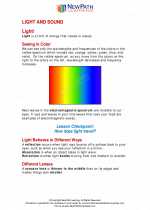 Light and sound
Light and sound  Worksheet/Answer key
Worksheet/Answer key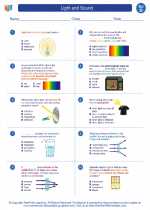 Light and sound
Light and sound  Worksheet/Answer key
Worksheet/Answer key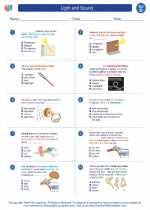 Light and sound
Light and sound  Worksheet/Answer key
Worksheet/Answer key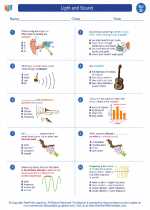 Light and sound
Light and sound  Vocabulary/Answer key
Vocabulary/Answer key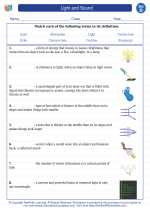 Light and sound
Light and sound  Vocabulary/Answer key
Vocabulary/Answer key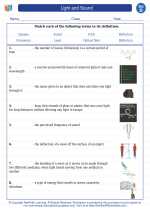 Light and sound
Light and sound  Vocabulary/Answer key
Vocabulary/Answer key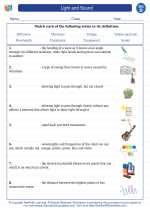 Light and sound
Light and sound 

 Worksheet/Answer key
Worksheet/Answer key
 Worksheet/Answer key
Worksheet/Answer key
 Worksheet/Answer key
Worksheet/Answer key
 Vocabulary/Answer key
Vocabulary/Answer key
 Vocabulary/Answer key
Vocabulary/Answer key
 Vocabulary/Answer key
Vocabulary/Answer key

The resources above cover the following skills:
PHYSICAL SCIENCE (NGSS)
Waves and their Applications in Technologies for Information Transfer
Students who demonstrate understanding can:
Develop a model of waves to describe patterns in terms of amplitude and wavelength and that waves can cause objects to move.